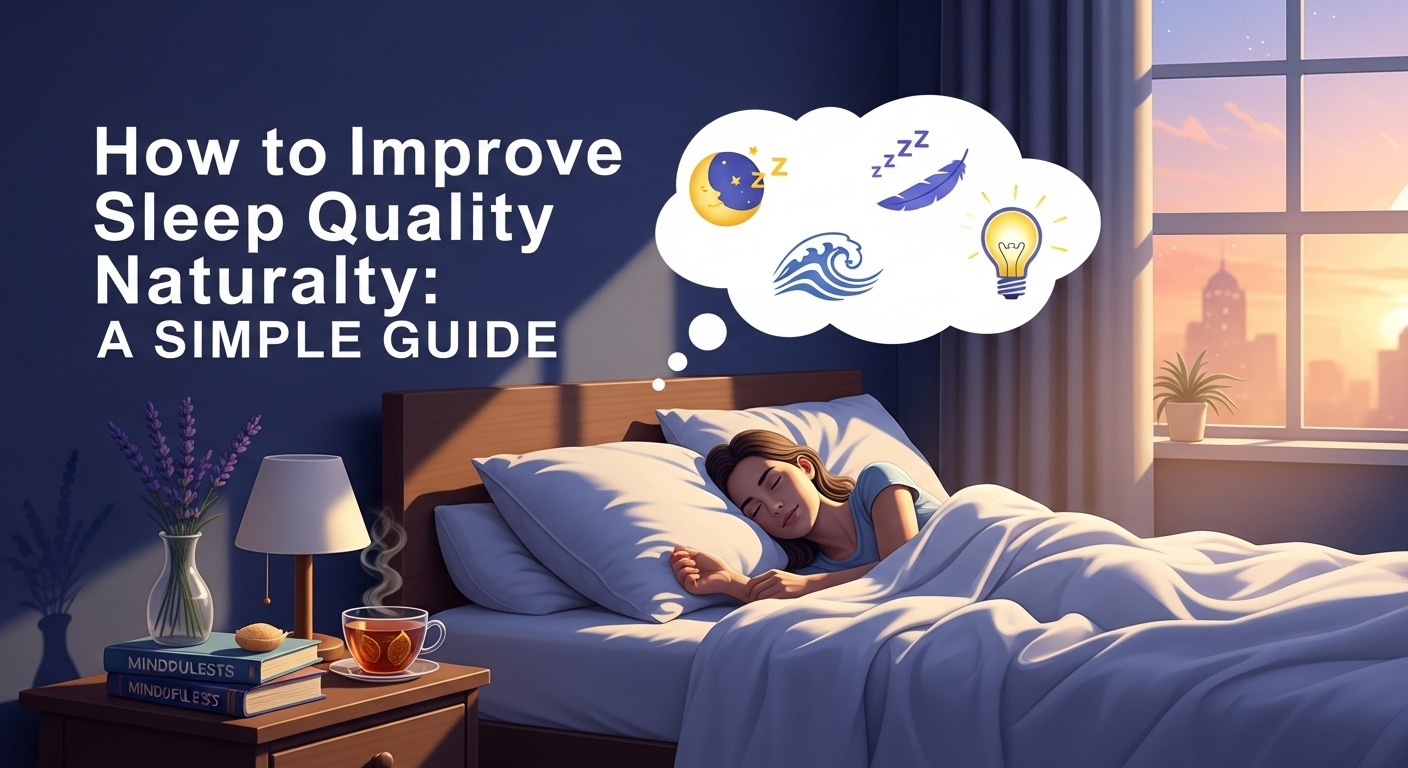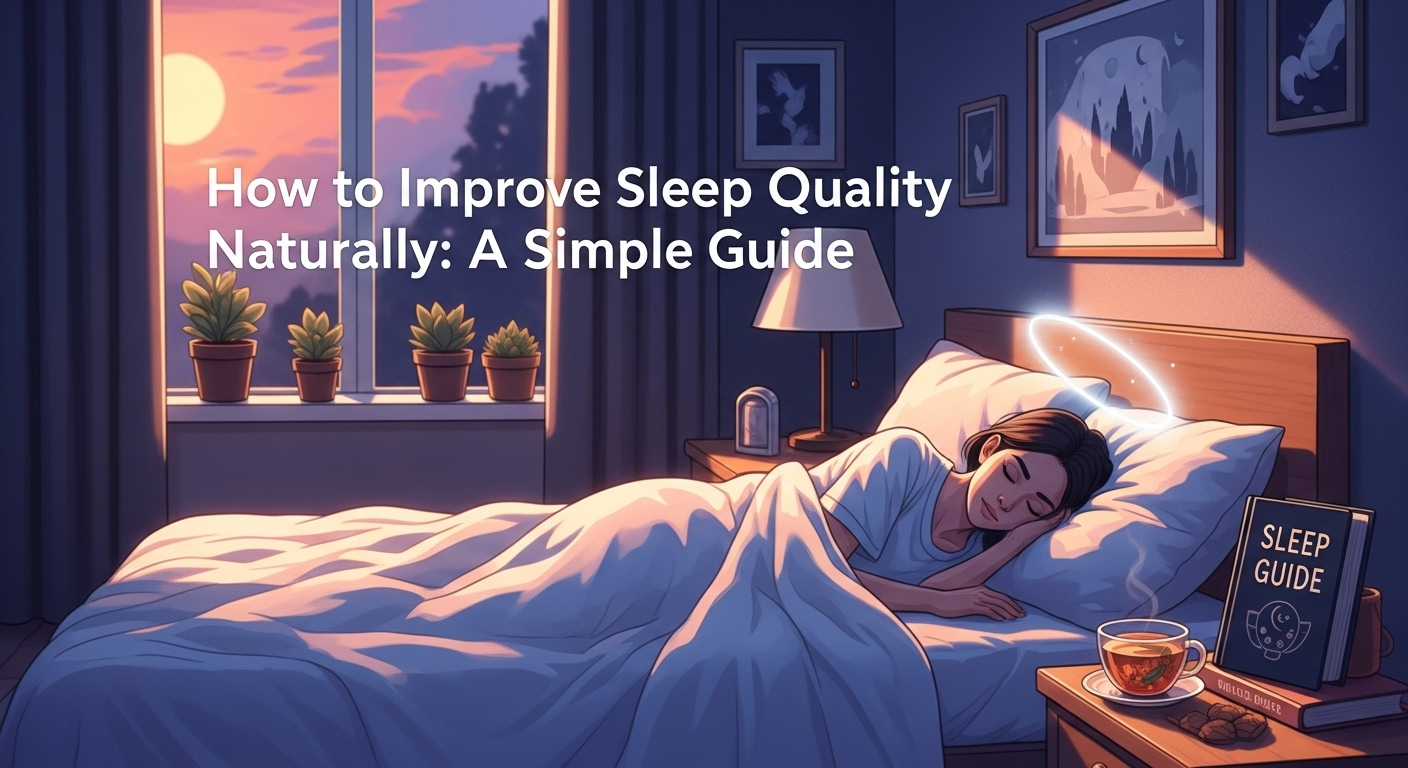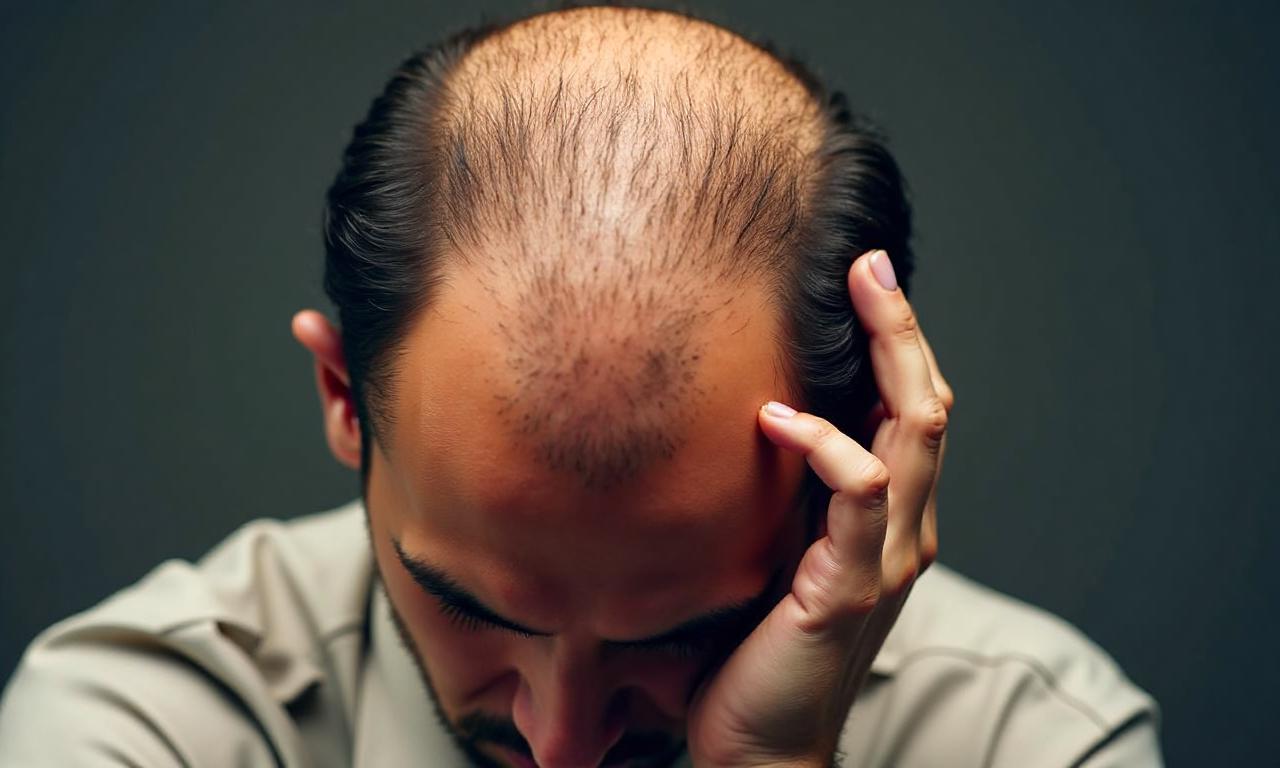In our fast-paced, always-on world, a good night's sleep often feels like a luxury rather than a necessity. Yet, the quality of our sleep directly impacts every facet of our lives, from mental clarity and emotional stability to physical health and immune function. Many people turn to quick fixes or medication, but understanding how to improve sleep quality naturally is the key to achieving sustainable, long-term restorative rest. This simple guide will walk you through evidence-based, natural strategies to transform your nights and energize your days, helping you unlock the profound benefits of truly deep and restful sleep.
Table of Contents
Toggle1. Optimize Your Sleep Environment for Restful Nights
Your bedroom should be a sanctuary for sleep, not a multi-purpose room for work, entertainment, and stress. The environment in which you sleep sends powerful signals to your brain, either encouraging relaxation or promoting alertness. An optimized sleep environment is dark, quiet, and cool, creating the ideal conditions for your body to produce melatonin—the hormone that governs your sleep-wake cycle. Think of it as setting the stage for a great performance; without the right props and lighting, the show can't go on as planned.
Creating this sanctuary involves a conscious effort to eliminate disruptions. This means addressing sources of light, noise, and uncomfortable temperatures. Even minor disturbances can fragment your sleep, pulling you out of deep, restorative stages without you even realizing it. Over time, these micro-awakenings accumulate, leaving you feeling tired and unrefreshed, even after spending eight hours in bed. The goal is to design a room so conducive to rest that falling asleep becomes an effortless, natural process.
Making these changes doesn't have to be expensive or complicated. Simple adjustments like using blackout curtains, wearing an eye mask, or utilizing a white noise machine can have a significant impact. The investment you make in creating a proper sleep environment is an investment in your overall health and well-being. It's one of the most effective and foundational steps you can take to reclaim your nights and improve your quality of life.
1. Control Light Exposure
Light is the most potent regulator of our internal body clock, or circadian rhythm. Exposure to light, particularly blue light emitted from electronic screens (phones, tablets, TVs, computers), suppresses the production of melatonin. This tricks your brain into thinking it's still daytime, making it difficult to wind down and fall asleep. Darkness, on the other hand, signals to your pineal gland that it's time to release melatonin, preparing your body for rest.
To harness the power of darkness, make your bedroom as pitch-black as possible. Invest in high-quality blackout curtains or blinds to block out streetlights and early morning sun. Cover or remove any electronics with glowing indicator lights, such as digital clocks or charging devices. If complete darkness is unattainable, a comfortable sleep mask is an excellent and affordable alternative. By minimizing light exposure in the hours leading up to and during bedtime, you are providing a clear, unambiguous signal to your brain that it's time to sleep.
2. Set the Ideal Room Temperature
Your body temperature naturally fluctuates throughout a 24-hour period, dropping slightly as you prepare for sleep and reaching its lowest point in the early morning. A cool room facilitates this natural temperature drop, promoting sleep onset and helping you stay asleep. A room that is too hot can interfere with this process, leading to restlessness, frequent awakenings, and a decrease in slow-wave (deep) and REM sleep.
Most sleep experts and scientific studies recommend a bedroom temperature between 60 to 67 degrees Fahrenheit (15 to 19 degrees Celsius) for optimal sleep. This may feel a bit chilly at first, but it creates the perfect conditions for your body's thermoregulation process. You can achieve this with an air conditioner, a fan, or by opening a window in cooler weather. Additionally, choosing breathable bedding made from natural fibers like cotton, bamboo, or linen can help wick away moisture and prevent you from overheating during the night.
2. Establish a Consistent Sleep-Wake Cycle
Consistency is perhaps the single most important factor in regulating your sleep. Your body thrives on routine, and your circadian rhythm is no exception. By going to bed and waking up at the same time every day—yes, even on weekends—you reinforce a stable sleep-wake cycle. This helps your body anticipate when to release sleep-inducing hormones like melatonin and alerting hormones like cortisol, making it easier to fall asleep at night and wake up feeling refreshed in the morning.
When your sleep schedule is erratic, you effectively give your body a form of "social jetlag." Sleeping in on weekends, for example, can shift your internal clock, making it difficult to get up on Monday morning and fall asleep on Sunday night. While it's tempting to "catch up" on sleep, this pattern often does more harm than good by constantly disrupting your body's natural rhythm. A consistent schedule is the anchor that keeps your internal clock synchronized with the 24-hour day.
Over time, a disciplined sleep schedule can become so ingrained that you may find yourself waking up naturally just before your alarm, a sign that your body clock is finely tuned. This regularity not only improves sleep quality but also enhances daytime alertness, mood, and cognitive function. It's a powerful, free, and entirely natural tool at your disposal.
1. Go to Bed and Wake Up at the Same Time
The key to a strong circadian rhythm is repetition. Choose a bedtime and wake-up time that allows for 7-9 hours of sleep and stick to it religiously. It can be helpful to set a "bedtime alarm" an hour before you intend to sleep as a reminder to start your wind-down routine. This consistency trains your brain to recognize your desired sleep window, making the transition from wakefulness to sleep smoother and more predictable.
Initially, this may be challenging, especially if your current schedule is irregular. You might find it hard to feel sleepy at your new bedtime or difficult to get out of bed in the morning. However, if you persevere for a week or two, your body will begin to adapt. Avoid the snooze button, as it fragments the last portion of your sleep and can lead to sleep inertia, that groggy feeling that can last for hours after waking.
2. Avoid Long or Irregular Naps
While a short "power nap" can be beneficial for some, long or late-in-the-day naps can seriously sabotage your nighttime sleep. Napping for more than 20-30 minutes, or napping after 3 p.m., can make it significantly harder to fall asleep at your regular bedtime. This is because it reduces the "sleep pressure" that builds up throughout the day, which is a natural chemical process that makes you feel tired at night.
If you feel you must nap, keep it short (under 30 minutes) and take it earlier in the day, preferably before 2 p.m. This can provide a quick boost of alertness without significantly impacting your ability to sleep at night. For many people struggling with insomnia, it's often better to avoid napping altogether and instead focus on consolidating all of their sleep into one solid nighttime block.
3. Mind Your Diet: What to Eat and Avoid for Better Sleep
The phrase "you are what you eat" extends to how well you sleep. The foods and beverages you consume throughout the day, and especially in the evening, can either support or hinder your ability to get a good night's rest. Certain nutrients can promote the production of sleep-regulating neurotransmitters, while other substances act as stimulants that keep you awake. Understanding the link between your diet and your sleep is a critical component of a natural approach to sleep improvement.
In general, it's wise to avoid large, heavy meals, excessive caffeine, and alcohol close to bedtime. A full stomach can cause discomfort and indigestion, while caffeine is a well-known stimulant that can stay in your system for hours. Alcohol, while it may initially make you feel drowsy, is notorious for disrupting sleep later in the night, particularly by suppressing REM sleep and causing frequent awakenings.
Instead, focusing on a balanced diet rich in whole foods creates the right biochemical foundation for quality sleep. Specific nutrients like magnesium, potassium, and the amino acid tryptophan play a direct role in relaxation and the synthesis of serotonin and melatonin. Including foods rich in these nutrients in your evening meal or as a light snack can naturally pave the way for a restful night.
—
Table: Foods to Favor and Foods to Avoid Before Bed
| Sleep-Promoting Foods & Nutrients | Sleep-Disrupting Foods & Substances |
|---|---|
| Tryptophan-rich foods: Turkey, chicken, nuts, seeds, oats | Caffeine: Coffee, black/green tea, soda, chocolate |
| Magnesium-rich foods: Almonds, spinach, bananas, avocados | Alcohol: Beer, wine, spirits of any kind |
| Melatonin-rich foods: Tart cherries, walnuts, pistachios | Heavy, fatty, or fried meals: Can cause indigestion and heartburn |
| Complex Carbohydrates: Whole-grain toast, oatmeal | Spicy foods: Can raise body temperature and cause stomach upset |
| Herbal Teas: Chamomile, valerian root, passionflower | High-sugar foods and refined carbs: Can cause blood sugar spikes and crashes |
| Potassium-rich foods: Bananas, sweet potatoes, beans | Excessive fluids: Can lead to frequent nighttime urination (nocturia) |
—
1. Foods and Nutrients that Promote Sleep
Certain foods contain compounds that can help you relax and fall asleep more easily. Tryptophan is an essential amino acid that serves as a precursor to serotonin, a neurotransmitter that promotes relaxation, which in turn is converted into melatonin. Pairing tryptophan-rich foods with a small portion of complex carbohydrates can help make the tryptophan more available to the brain. A great example is a slice of whole-grain toast with almond butter.
Other key minerals include magnesium, often called the "relaxation mineral," which helps calm the nervous system, and potassium, which can help prevent nighttime muscle cramps. Foods like almonds, bananas, and leafy greens are excellent sources. Additionally, some foods, like tart cherries and walnuts, contain a natural source of melatonin itself. A cup of caffeine-free herbal tea, such as chamomile or valerian root tea, can also be a wonderful part of a pre-sleep ritual, thanks to their mild sedative properties.
2. The Timing of Your Meals Matters
When you eat is just as important as what you eat. Eating a large, rich meal right before bed forces your digestive system to work overtime when it should be resting. This can lead to physical discomfort, acid reflux, or heartburn, all of which can keep you from falling or staying asleep. Your body's metabolism naturally slows down at night, making it harder to process a heavy meal.
As a general rule, try to finish your last big meal at least 2-3 hours before you plan to go to sleep. This gives your body ample time to digest. If you feel hungry before bed, opt for a light, small snack that combines a complex carbohydrate with a protein or healthy fat, such as a small bowl of oatmeal, a handful of almonds, or a banana. This can stabilize your blood sugar and prevent hunger pangs from waking you up without overburdening your digestive system.
4. Incorporate Movement and Mindfulness into Your Day

Your mental and physical state throughout the day profoundly influences your ability to sleep at night. Regular physical activity and practices that manage stress are two of the most powerful natural tools for improving sleep quality. Exercise helps regulate body temperature, reduce anxiety, and tire the body in a healthy way. Mindfulness and relaxation techniques, on the other hand, help quiet a racing mind, which is one of the most common barriers to falling asleep.
The relationship between exercise and sleep is bidirectional. Regular activity improves sleep, and better sleep, in turn, provides you with more energy for exercise. However, the timing of your workout is crucial. While moderate daily exercise is highly beneficial, vigorous, high-intensity exercise performed too close to bedtime can be over-stimulating for some individuals, raising heart rate, adrenaline, and body temperature.
Similarly, unmanaged stress is a major culprit behind insomnia. When you're stressed, your body produces excess cortisol, an alerting hormone that is a natural antagonist to melatonin. Learning to activate your body's relaxation response through mindfulness, deep breathing, or journaling can counteract the effects of stress, lower cortisol levels, and create a state of mental calm conducive to sleep.
1. The Role of Regular Exercise
Engaging in at least 30 minutes of moderate aerobic exercise most days of the week can significantly improve sleep quality. Activities like brisk walking, jogging, swimming, or cycling are excellent choices. Exercise increases the amount of time you spend in deep sleep, the most physically restorative stage of sleep. It also helps reduce sleep latency (the time it takes to fall asleep) and decrease nighttime awakenings.
For best results, aim to complete your workout at least 3-4 hours before your bedtime. This allows your body temperature and heart rate to return to their baseline levels. If you can only exercise in the evening, opt for lighter, more restorative activities like yoga, stretching, or a gentle walk. These can actually help you wind down rather than rev you up.
2. Stress-Reduction Techniques Before Bed
If a racing mind keeps you awake, a pre-sleep mindfulness practice can be transformative. This isn't about "emptying your mind" but rather about gently redirecting your focus away from anxious thoughts. Techniques like meditation, guided imagery, or progressive muscle relaxation can help shift your nervous system from a "fight-or-flight" state to a "rest-and-digest" state.
One simple yet powerful technique is diaphragmatic breathing (belly breathing). Lie down comfortably and place one hand on your chest and the other on your belly. Inhale slowly and deeply through your nose for a count of four, allowing your belly to rise. Hold the breath for a count of four, and then exhale slowly through your mouth for a count of six. Repeating this for 5-10 minutes can dramatically lower your heart rate and calm your mind. Journaling, or writing down your worries and a to-do list for the next day, can also help "offload" them from your mind before sleep.
5. Create a Relaxing Pre-Sleep Routine
Just as you warm up before exercise, you need to "wind down" before sleep. A consistent pre-sleep routine is a powerful psychological cue that signals to your brain and body that the day is ending and it’s time to prepare for rest. This routine should be a buffer zone between the stress and stimulation of your day and the calm required for sleep. It should consist of calming activities that you enjoy and that relax you.
In our hyper-connected culture, it's common to scroll through social media, answer work emails, or watch intense TV shows right up until the moment we turn off the lights. These activities are highly stimulating and keep our brains in an alert, engaged state, making the transition to sleep abrupt and difficult. Your brain doesn't have an "off" switch; it has a dimmer. A wind-down routine is how you gradually dim the lights on your consciousness.
The ideal routine should last anywhere from 30 to 60 minutes and be performed in the same order each night to maximize its conditioning effect. The specific activities are less important than the consistency and the feeling of relaxation they evoke. It's about consciously disengaging from the demands of the day and creating a peaceful space for yourself.
1. The Digital Detox: Limiting Screen Time
One of the most crucial elements of any modern wind-down routine is a "digital curfew." As mentioned earlier, the blue light from screens is a powerful melatonin suppressant. But beyond the light, the content we consume on these devices is often emotionally or mentally activating. News headlines, work emails, and social media feeds are designed to engage, and often agitate, our minds.
Commit to powering down all electronic screens at least 60-90 minutes before your intended bedtime. Use this time for screen-free activities. If you use your phone as an alarm, place it across the room and set it to "Do Not Disturb" mode so notifications don't tempt you. If you absolutely must use a screen, enable "night mode" or use a blue-light-filtering app, but remember that this only addresses the light, not the stimulating nature of the content.
2. Calming Activities to Unwind
Fill your digital-free wind-down time with activities that you find genuinely soothing. This is a highly personal choice, but some popular and effective options include:
- Taking a warm bath or shower: The subsequent drop in body temperature after you get out mimics the natural temperature drop that precedes sleep, promoting drowsiness.
- Reading a physical book: Choose something relaxing, not a gripping thriller. Reading from a paper book avoids blue light exposure.
- Listening to calm music or a podcast: Select genres like classical, ambient, or podcasts specifically designed for sleep.
- Gentle stretching or restorative yoga: Focus on poses that release tension in the neck, shoulders, and hips.
- Practicing a hobby: Activities like knitting, drawing, or doing a puzzle can be very meditative.
6. When to Consider Professional Help
While the natural strategies outlined in this guide are incredibly effective for most people, it's important to recognize when a persistent sleep problem may indicate an underlying medical condition. If you have been diligently practicing good sleep hygiene for several weeks or months and are still struggling with severe, debilitating sleep issues, it may be time to consult a professional. Chronic sleep problems can sometimes be a symptom of a more serious issue that requires medical diagnosis and treatment.
Certain symptoms are red flags that should not be ignored. For example, if your partner reports that you frequently gasp for air, choke, or stop breathing during sleep, you may have sleep apnea, a serious condition that requires medical intervention. Similarly, if you have an uncontrollable urge to move your legs at night (Restless Legs Syndrome) or experience chronic, severe difficulty falling or staying asleep (chronic insomnia), self-help may not be enough.
Don't hesitate to speak with your primary care physician or a board-certified sleep specialist. They can help diagnose or rule out underlying conditions, offer advanced behavioral therapies like CBT-I (Cognitive Behavioral Therapy for Insomnia), or discuss other treatment options. Seeking professional help is not a failure; it's a proactive and responsible step toward reclaiming your health.
Conclusion
Improving your sleep quality naturally is not about finding a single magic bullet, but rather about building a holistic system of healthy habits. It's a journey that involves optimizing your environment, stabilizing your schedule, being mindful of your diet, incorporating movement and mindfulness, and creating a dedicated pre-sleep routine. Each of these pillars works in synergy to support your body's innate ability to rest and rejuvenate.
The path to better sleep requires patience and consistency. Some changes, like creating a darker room, may yield immediate benefits, while others, like syncing your circadian rhythm, will take a couple of weeks to take full effect. Listen to your body, be willing to experiment, and find what works best for you.
By taking these simple, natural steps, you are making a profound investment in your long-term health and happiness. Restful sleep is the foundation upon which a productive, vibrant, and joyful life is built. Start tonight, and empower yourself to wake up feeling truly restored.
Frequently Asked Questions (FAQ)
Q: How long does it take to see improvements in sleep quality after implementing these changes?
A: The timeline can vary. You might notice benefits from environmental changes (like a darker, cooler room) on the very first night. However, for changes related to your circadian rhythm, such as maintaining a consistent sleep-wake schedule, it typically takes 1-2 weeks for your body to fully adapt and for you to feel the consistent benefits. The key is consistency.
Q: Is it bad to use my phone in bed if I have a blue light filter on?
A: While using a blue light filter or "night mode" is better than not using one, it doesn't completely solve the problem. The content on your phone—whether it's social media, news, or work emails—is often mentally or emotionally stimulating. This can trigger an alert, "engaged" state in your brain, which is the opposite of the calm state needed for sleep. It's best to put all screens away at least an hour before bed.
Q: Can natural supplements like melatonin or valerian root really help?
A: Natural supplements can be helpful for some people in certain situations, but they are not a long-term solution and should be used with caution. Melatonin can be effective for jet lag or for shift workers, but its long-term daily use is debated. Valerian root has mild sedative properties but can have side effects. It's always best to focus on foundational sleep hygiene behaviors first and consult with a doctor before starting any new supplement.
Q: What should I do if I wake up in the middle of the night and can't get back to sleep?
A: First, avoid looking at the clock, as this can cause anxiety about the time you have left to sleep. Try practicing a relaxation technique, like deep breathing, in bed. If you are still awake after about 20 minutes, get out of bed and go to another room. Do a quiet, relaxing activity in dim light, such as reading a dull book or listening to calm music. Return to bed only when you feel sleepy again. This prevents your brain from associating your bed with a place of frustration and wakefulness.
***
Article Summary
This guide, "How to Improve Sleep Quality Naturally: A Simple Guide," provides a comprehensive framework for achieving better sleep without medication. The core strategy is built on five key pillars.
First, optimize your sleep environment by making your bedroom dark, quiet, and cool (60-67°F or 15-19°C) to support natural melatonin production. Second, establish a consistent sleep-wake cycle by going to bed and waking up at the same time daily, even on weekends, to regulate your body's internal clock. Third, be mindful of your diet, avoiding stimulants like caffeine and alcohol before bed, and instead opting for sleep-promoting foods rich in tryptophan and magnesium, finishing your last large meal 2-3 hours before sleep.
Fourth, incorporate daily movement and mindfulness; regular moderate exercise improves deep sleep, while stress-reduction techniques like deep breathing or journaling calm a racing mind. Finally, create a relaxing, screen-free pre-sleep routine for 30-60 minutes to signal to your body that it's time to wind down. The article also advises when to seek professional help for persistent issues and includes an FAQ section addressing common sleep-related questions. The overarching message is that sustainable sleep improvement comes from building a holistic system of healthy, consistent habits.














